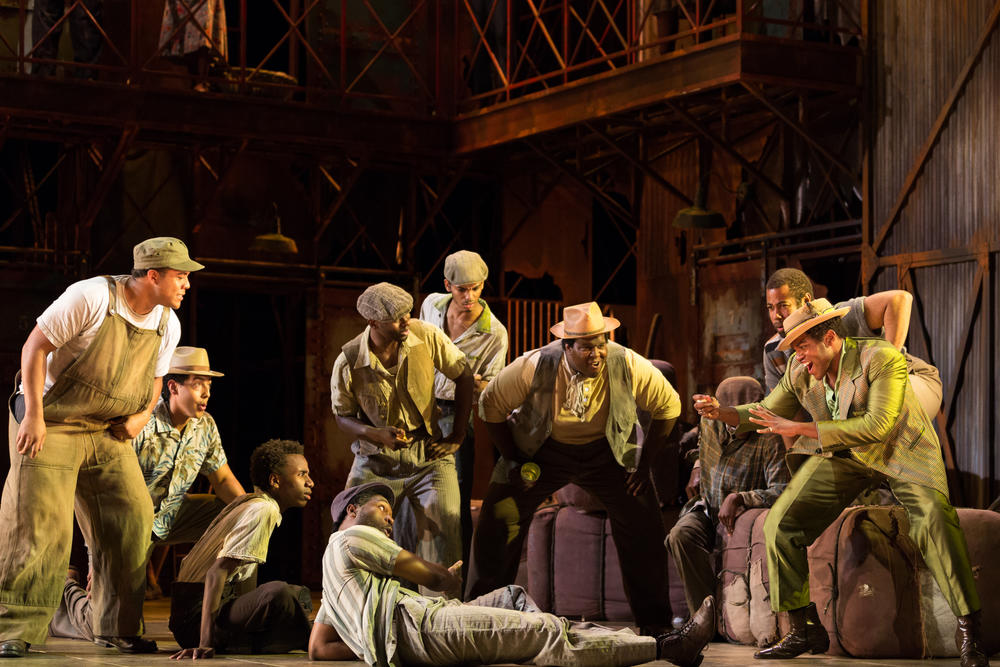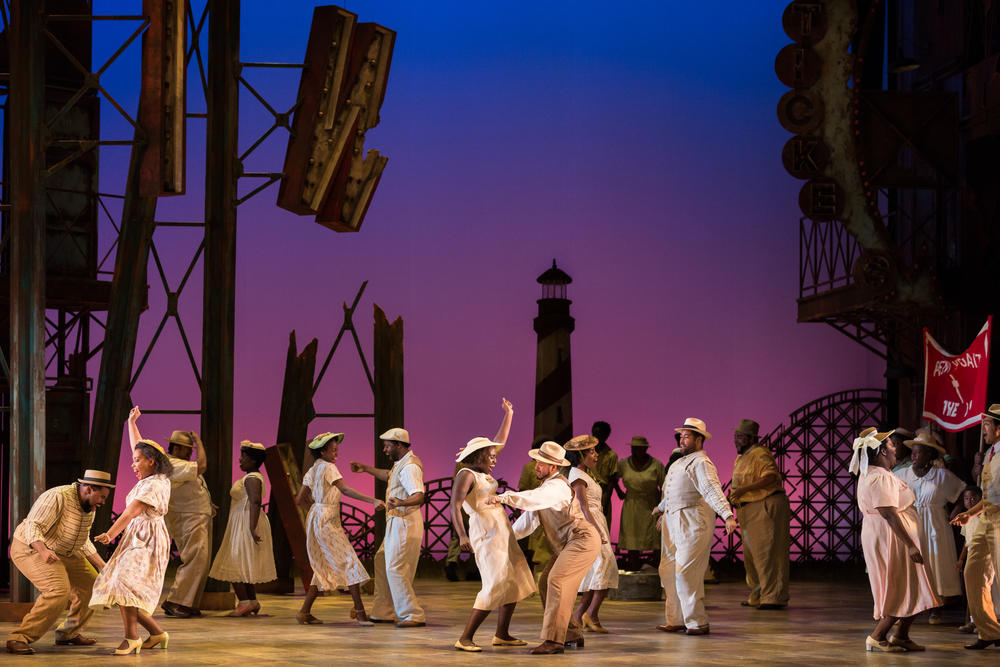Section Branding
Header Content
George Gershwin's 'Porgy And Bess' And Its Complicated Legacy Around Race
Primary Content
While not many operas were written in English, George Gershwin's Porgy and Bess is one of the most celebrated — and perhaps the most controversial.
Although the production provided roles for African American performers during a time when minstrelsy was still prevalent, criticism of the opera's representation of black culture, life and dialect have followed Gershwin's piece, from 1935, for decades.
"On Second Thought" host Virginia Prescott speaks with Morris Robinson and Dr. Naomi André.
The Atlanta Opera is staging Porgy and Bess for five performances between Mar. 7 and 15. Part of this production has included programming to discuss the racial dilemma presented by Gershwin's opera.
Dr. Naomi André is professor of women's and African American studies at the University of Michigan. She's also the inaugural Scholar-in-Residence at the Seattle Opera and author of Black Opera: History, Power, Engagement. She joined On Second Thought to talk about the complicated questions that surround Porgy and Bess.
"It really feels like such an American classic, these songs and arias," Dr. André said. "However, there's the really tough thing about the portrayal of African American life."
That's because the opera incorporates a number of negative stereotypes, such as crime, poverty, drug-dealing and drug use, gambling and more. That, along with Gershwin's fake approximation of African American dialect, raises eyebrows.
Opera singer Morris Robinson, who will be performing the role of Porgy for three of the five nights of the Atlanta Opera's production, also joined the conversation to share his perspective as a performer. He explained that he avoided the opera for a large portion of his career, so as to not be typecast.
"I'm a big black man, bald head," Robinson explained. "I'm from the South; I have a very deep voice. And I've said this before. People, as soon as they hear me speak and find out that I'm a singer, there are two things they automatically assume: you can sing 'Ol' Man River' really, really well, and you probably can sing Porgy really, really well."
Still, these roles in Porgy and Bess are some of the few parts offered to black operatic singers and performers. Robinson suggests that the challenges of representation onstage may reflect a lack of diversity backstage.
"In this business, we have to keep in mind: I've never been hired by a black artistic manager," he said. "I've never been conducted by a black conductor. I've never been directed by a black director. They do exist, but they don't exist at the levels that we've been afforded to sing. So we have to start at the top, top down, to broaden the perspective and broaden the opportunities of us onstage."
Both André and Robinson noted that the opera itself — the music, the arc of the story, and the overall performance — is beautiful. But André notes that in modern times, any production of Gershwin's classic opera should not stand alone.
"There are a lot of important themes around representation, and who should sing what, and how somebody sings something," André said. "So while it's a nice thought to think opera should be colorblind, when we go out there as audiences, we're not. We cannot not see race. We cannot not see gender. So what needs to happen in 2020 is we need to be careful with these things. We need program notes. We need directors who think about this, and we need this to be brought up to the surface."
And in other interviews, André has suggested that, beyond that, production houses can and should find ways to share different and diverse perspectives onstage, and let new voices emerge.
INTERVIEW HIGHLIGHTS
On one reason why George Gershwin wanted African Americans to perform the roles in Porgy and Bess in 1935
Robinson: I would think that he, first of all, just to keep the authenticity of what it is that he was trying to capture, he knew he needed a certain type of person on stage to do it, and they'd get it. This is virtuosic music. [...] It's very difficult. You need to be well-trained in music to understand the score and to perform it to perfection. But also, there's certain unwritten things, certain syncopations, certain natural rhythms that come with this. And I don't think that someone from Europe could do it as well as somebody that grew up in America, especially with the black church experience. So maybe that was part of the deal.
On why Robinson did not want to perform in Porgy and Bess for nearly two decades of his career
Robinson: I avoided the whole opera, you know. One of the things you heard early on [...] in your career as a young African American opera singer is: you want to stay away from certain things so that you don't get pigeonholed and typecast. I'm a big black man, bald head; I'm from the South; I have a very deep voice. And I've said this before. People, as soon as they hear me speak and find out that I'm a singer, there are two things they automatically assume: you can sing “Ol’ Man River” really, really well, and you probably can sing Porgy really, really well. Now, musically, Porgy is written for more of a bass-baritone, baritone voice. I'm a real bass. So I never thought it would be an issue for me. But I purposely stayed away from that repertoire for 17 years, until I firmly planted myself in German and Italian literature. I did all the Puccini, Verdi, Mozart, you know, that I could do. And then, when asked to do it, it was La Scala calling. It was like, okay, if I’m ever going to have a reason to justify stepping out into this, historically, I’ll be able to say well, it was La Scala, so. You don’t say no to them but once.
On one of the main questions surrounding Porgy and Bess
André: Is Porgy racist or not? And that is a tough question. I'll speak very personally that I find it a very bittersweet experience. I love the music. I've grown up with the music and all the wonderful covers by people from Miles Davis and Nina Simone and Billie Holiday to Janis Joplin. I mean, [...] it really feels like such an American classic, these songs and arias. However, there's the really tough thing about the portrayal of African American life.
On how productions of Porgy and Bess can acknowledge and address the problematic elements of the opera for modern audiences
André: There are a lot of important themes around representation and who should sing what and how somebody sings something. So while it's a nice thought to think opera should be colorblind, when we go out there as audiences, we're not, we cannot not see race. We cannot not see gender. So what needs to happen in 2020 is we need to be careful with these things. We need program notes. We need directors who think about this and we need this to be brought up to the surface.
Should Latonia Moore sing Madama Butterfly, an African-American woman singing a Japanese character? Absolutely. However, because opera is a little different than the movies and Broadway and TV, we need to say a lot of this is about the voice, and not everybody can do this. And voices come in many different bodies, which is beautiful. And so there is an element of colorblindness, but [..] opera, I think, is a special situation. Having shows like this where we talk about it is a wonderful thing, because then the larger audience can say, “Wait a minute, am I supposed to like this or am I supposed to be nervous?” And it's like, no, it is okay, we've got you covered. There's a little suspension of disbelief when we watch something on the opera stage. We don't expect that to be the real reality. I think people want to love and enjoy these new things and particularly the people who are fans, diehard fans, and who's loved this music before we started asking these questions. But if we can talk about it and put some words to it, that's the way to handle it.
Get in touch with us.
Twitter: @OSTTalk
Facebook: OnSecondThought
Email: OnSecondThought@gpb.org
Phone: 404-500-9457




